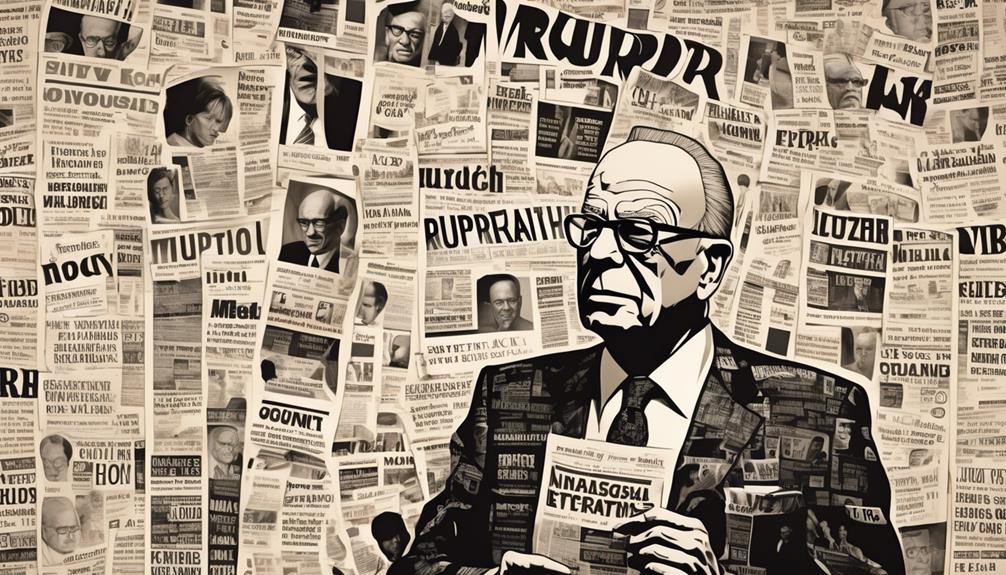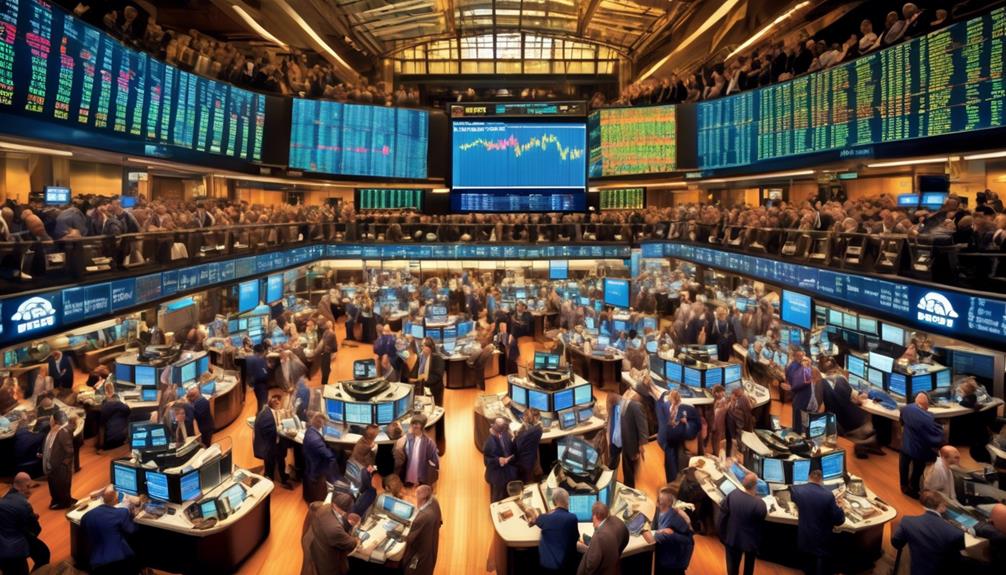As authors, we frequently find inspiration in the intellect and perspectives of remarkable individuals. Rupert Murdoch, the well-known Australian-American media titan, is one person whose influence has profoundly shaped the media industry. Much like a skilled skipper guiding a vessel through new territories, Murdoch has directed his media conglomerate with unparalleled strategic foresight and steadfastness.
Throughout his long and controversial career, he has made numerous statements that have both captivated and polarized the masses. From his business philosophy to his views on journalism, Murdoch's quotes offer a glimpse into the mind of a man who has shaped the media industry as we know it today.
In this collection of quotes, we explore the thoughts and ideas of this influential figure, examining his legacy and the impact he has had on the world of media.
Key Takeaways
- Rupert Murdoch is a highly influential and controversial figure in the media industry, known for his relentless drive for success and strategic approach to media acquisitions.
- He has been involved in numerous controversies, including the News of the World phone hacking scandal, controversial remarks about Muslims, biased reporting during the Brexit campaign, dismissal of sexual harassment allegations, and divisive coverage during the Black Lives Matter protests.
- As the owner of media outlets like Fox News and The Wall Street Journal, Murdoch has the ability to shape public opinion and set political agendas, raising concerns about media ethics and freedom of the press.
- Murdoch's legacy includes the expansion of his media empire through strategic acquisitions, adaptation to changing technologies and consumer preferences, and shaping the media landscape as we know it today, while also raising questions about media responsibility and ethics.
Early Life and Career Beginnings
In the early stages of his life and career, Rupert Murdoch embarked on a journey that would shape the media landscape for decades to come. Born on March 11, 1931, in Melbourne, Australia, Murdoch grew up in a family that valued journalism and media. His father, Sir Keith Murdoch, was a prominent newspaper publisher, and his mother, Dame Elisabeth Murdoch, was an accomplished philanthropist.
Murdoch's early exposure to the media industry undoubtedly influenced his career path. After completing his education at Geelong Grammar School, he attended Worcester College, Oxford, where he studied philosophy, politics, and economics. It was during this time that he gained a deeper understanding of the political and economic forces that would later shape his media empire.
In 1952, at the age of 21, Murdoch returned to Australia and took over the family business, News Limited. Under his leadership, the company expanded its operations and ventured into new markets, including the United Kingdom and the United States. Murdoch's strategic acquisitions, such as The Sun and The Times in the UK and The New York Post in the US, further solidified his influence in the media industry.
From these early beginnings, Rupert Murdoch's career skyrocketed, and he became one of the most influential and controversial figures in the media world. His relentless pursuit of success and his ability to adapt to changing technologies and consumer preferences have made him a true media mogul.
Rupert Murdoch's Business Philosophy

Rupert Murdoch's business philosophy is characterized by his relentless drive for success, adaptability to changing technologies and consumer preferences, and his influence as a true media mogul. Murdoch's management style is known for its hands-on approach and his ability to make bold decisions. He believes in taking risks and pushing boundaries, which has led to his success in the media industry.
One of the key aspects of Murdoch's business philosophy is his strategic approach to media acquisitions. Throughout his career, he's been known for acquiring various media outlets, including newspapers, television networks, and film studios. His acquisitions have allowed him to expand his media empire and gain a significant influence in the industry.
Murdoch's adaptability to changing technologies and consumer preferences has also been crucial to his success. He's consistently embraced new technologies, such as the internet, and adapted his businesses to meet the changing demands of his audience. This ability to anticipate and respond to shifts in the media landscape has allowed him to stay relevant and maintain his position as a leading media figure.
Controversial Statements and Public Outbursts
After discussing Rupert Murdoch's business philosophy, it's important to now examine his history of controversial statements and public outbursts. Murdoch, as a prominent media mogul, has been known for making remarks that have stirred up controversy and raised questions about media ethics and freedom of the press. Here are five notable instances:
- In 2011, Murdoch faced backlash when his newspaper, News of the World, was exposed for hacking the phones of crime victims and celebrities. The scandal led to the closure of the newspaper and raised concerns about privacy invasion.
- In a tweet in 2013, Murdoch made controversial remarks about Muslims, stating that 'Islam is a religion of peace, but Muslims make it difficult for others to see that.' The comment drew criticism for perpetuating Islamophobia and generalizing an entire religious community.
- During the Brexit campaign in 2016, Murdoch's newspapers, such as The Sun, were accused of biased reporting and spreading misinformation to influence public opinion. This raised concerns about the role of media in shaping political discourse.
- In 2017, Murdoch faced backlash for dismissing sexual harassment allegations against powerful men in the entertainment industry as 'nonsense.' His comments were seen as insensitive and dismissive of the experiences of victims.
- In 2020, amidst the Black Lives Matter protests, Murdoch faced criticism for his media outlets' coverage, which was perceived as biased and divisive. This raised questions about media responsibility in promoting social cohesion and understanding.
These instances highlight the controversies surrounding Murdoch's statements and the impact they've had on media ethics and freedom of the press.
Influence on Politics and Media Landscape

With his vast media empire and significant political connections, Rupert Murdoch has wielded a considerable influence on both the political landscape and the media industry. As the owner of numerous media outlets, including Fox News and The Wall Street Journal, Murdoch has been able to shape public opinion and set political agendas through his editorial decisions and news coverage. This has raised concerns about political bias and the concentration of media ownership in the hands of a few powerful individuals.
| Political Bias | Media Ownership |
|---|---|
| Murdoch's media outlets have been accused of having a conservative bias, particularly in their coverage of political events and issues. This has led to criticism that his media empire promotes a specific agenda and influences public opinion in favor of conservative ideologies. | Murdoch's ownership of a wide range of media outlets gives him significant control over the information that reaches the public. This concentration of media ownership has raised concerns about the diversity of voices and perspectives in the media landscape, as well as the potential for undue influence on political discourse. |
Despite the controversies surrounding Murdoch's influence on politics and the media, there is no denying the impact he has had on shaping public opinion and driving political narratives. His media empire has played a significant role in shaping the media landscape, and his political connections have allowed him to exert influence on political decision-making. As a result, Murdoch's influence continues to be a topic of debate and scrutiny in both the political and media spheres.
Views on Journalism and News Reporting
When examining Rupert Murdoch's views on journalism and news reporting, it's important to consider his significant influence on the industry. Murdoch has built a media empire that includes influential outlets such as Fox News and The Wall Street Journal.
However, his media controversies, such as allegations of biased reporting and unethical practices, have also sparked criticism and raised questions about the integrity of his journalistic approach.
Murdoch's Journalistic Influence
Murdoch's impactful influence on journalism and news reporting is evident through his strong convictions and strategic media endeavors. Some key aspects of his influence include:
- Shaping public discourse: Murdoch's media empire has played a significant role in shaping public opinion through its vast reach and influence.
- Political agenda: Murdoch has been known to use his media outlets to promote his own political views and agendas.
- Media consolidation: Murdoch's acquisition of various media companies has contributed to the consolidation of media ownership, raising concerns about diversity of voices and journalistic integrity.
- Sensationalism: Murdoch's tabloid-style approach to news reporting has often prioritized sensationalism over accuracy and objectivity.
- Ethical concerns: Murdoch's media outlets have faced criticism for their questionable journalistic ethics, including invasion of privacy and biased reporting.
Murdoch's Media Controversies
Rupert Murdoch's media empire has been embroiled in numerous controversies surrounding its approach to journalism and news reporting. As one of the most influential media owners in the world, Murdoch has faced criticism for prioritizing profit over ethical journalism.
One of the main concerns surrounding Murdoch's media ownership is the potential for bias and lack of objectivity in reporting. Critics argue that his media outlets have a tendency to promote his own political and business interests, leading to a distortion of the news.
Another controversy is the alleged phone hacking scandal that occurred at Murdoch's now-defunct News of the World tabloid in the UK. This unethical practice of hacking into people's phones for stories resulted in public outrage and legal consequences.
Below is a table summarizing some of the key controversies surrounding Murdoch's media empire:
| Controversy | Description |
|---|---|
| Bias in reporting | Critics claim that Murdoch's media outlets prioritize his personal interests, leading to biased reporting. |
| Phone hacking scandal | The News of the World tabloid was accused of hacking into people's phones for stories, leading to a major scandal. |
| Influence on politics | Murdoch's media empire has been accused of using its influence to shape political agendas and elections. |
These controversies raise important questions about the ethics and responsibilities of media ownership. It is crucial for journalists and news organizations to prioritize accurate, unbiased reporting in order to maintain public trust and uphold the principles of ethical journalism.
Legacy and Impact on the Media Industry

Rupert Murdoch's impact on the media industry can't be understated. His media empire, which includes outlets like Fox News and The Wall Street Journal, has transformed the way news is reported and consumed.
Murdoch's influence on the news landscape has been significant, shaping public opinion and advancing a conservative agenda. His legacy as a media mogul will continue to be felt for years to come, leaving a lasting imprint on the industry.
Media Industry Transformation
The media industry has undergone a significant transformation, leaving a lasting impact on the way information is disseminated and consumed. This transformation can be attributed to several factors, including media industry disruption and technological advancements.
Here are five key aspects of the media industry's current transformation:
- Digitalization: With the rise of the internet, media has shifted from traditional print and broadcast formats to digital platforms, allowing for instant and global access to information.
- Social media: Platforms like Facebook, Twitter, and Instagram have revolutionized the way news is shared, enabling individuals to become active participants in the news cycle.
- Mobile technology: The widespread adoption of smartphones and tablets has made news accessible on the go, further accelerating the consumption of media.
- Data-driven journalism: Journalists now have access to vast amounts of data, allowing for more in-depth analysis and storytelling.
- Citizen journalism: The rise of user-generated content has democratized the news industry, giving a voice to ordinary individuals and challenging traditional gatekeepers.
These changes haven't only disrupted established media organizations but have also transformed the way society consumes and interacts with information.
Influence on News Landscape
The transformation of the media industry has left a lasting impact on the news landscape, shaping the way information is disseminated and consumed by society.
One significant aspect of this influence is the consolidation of media ownership, a trend that has been driven in part by media moguls like Rupert Murdoch. Through his company, News Corporation, Murdoch has acquired numerous media outlets, leading to a concentration of power and influence in the hands of a few conglomerates.
This consolidation has raised concerns about the potential for biased reporting and a lack of diverse perspectives in the news. Critics argue that media ownership consolidation can result in a homogenized news landscape, with limited choices for consumers and a higher likelihood of biased reporting.
As such, Murdoch's influence on the media industry has sparked ongoing debates about news media bias and the need for a more diverse and independent news landscape.
Legacy of Media Empire
With his extensive media empire, Rupert Murdoch has left a lasting impact on the media industry, shaping its landscape and influencing the way news is produced and consumed. His business success has revolutionized the media landscape in several ways:
- Diversification: Murdoch's media empire spans across various platforms, including television, film, print, and digital media, giving him unprecedented control and influence over the industry.
- Global Reach: Murdoch's empire extends beyond borders, with media properties in multiple countries, allowing him to shape the media landscape on a global scale.
- News Corporation: Murdoch founded News Corporation, a multinational mass media company, which has become one of the largest and most influential media conglomerates in the world.
- Political Influence: Murdoch's media properties have been known to shape public opinion and influence political outcomes, making him a powerful player in the political arena.
- Digital Transformation: Murdoch's empire has adapted to the digital age, embracing online platforms and digital content, thereby reshaping the way news is produced and consumed in the digital era.
Lessons From Rupert Murdoch's Success

From Rupert Murdoch's remarkable career, we can glean valuable lessons for achieving success in the world of business and media. Murdoch's success can be attributed to his astute business strategies and his ability to adapt to changing market dynamics. Here are three key lessons we can learn from his success:
| Lessons | Success Strategies | Impact |
|---|---|---|
| 1. Embrace Innovation | Murdoch was never afraid to embrace new technologies and platforms. He recognized the potential of cable television early on and launched Fox News, which became a dominant force in the media industry. | Embracing innovation can lead to new opportunities and help stay ahead of the competition. |
| 2. Focus on Content | Murdoch understood the importance of compelling content. He invested in quality journalism and entertainment, acquiring renowned companies like 21st Century Fox and The Wall Street Journal. | Prioritizing content can attract and retain audiences, leading to increased revenue and market share. |
| 3. Take Calculated Risks | Murdoch was known for taking calculated risks, such as his bold move to launch satellite television in the UK with Sky. Despite initial skepticism, this venture turned out to be highly successful. | Taking calculated risks can lead to new business ventures and expansion into untapped markets.
Frequently Asked Questions
What Were the Specific Events in Rupert Murdoch's Early Life That Shaped His Career Path?
Early influences and personal experiences played a significant role in shaping our career trajectory. We believe that Rupert Murdoch's early life was marked by a series of events that influenced his path in the media industry.
These experiences, combined with his keen business acumen and determination, contributed to his professional growth. It's fascinating to examine how these factors align and showcase the impact of early influences on one's career.
How Did Rupert Murdoch's Business Philosophy Evolve Over Time?
Over time, Rupert Murdoch's business philosophy evolved significantly, shaping the media industry through his influence.
He implemented various business strategies and tactics to expand his empire, including acquiring multiple media companies and launching new ventures.
His focus on market dominance and profitability led to a consolidation of power within the industry.
Murdoch's ability to adapt to changing technologies and consumer preferences further solidified his position as a media mogul.
His legacy is defined by his relentless pursuit of influence and success in the media landscape.
Can You Provide Examples of Controversial Statements and Public Outbursts Made by Rupert Murdoch?
Rupert Murdoch controversy and public outbursts have been widely discussed. His statements on various topics, such as immigration, climate change, and political candidates, have stirred controversy.
One example is his tweet about 'Birther' claims against President Obama, which received backlash for promoting conspiracy theories.
Another instance was when he compared climate change activists to 'alarmists' and questioned the scientific consensus.
These controversial statements and public outbursts have often sparked debates and criticism, highlighting the divisive nature of Murdoch's views.
How Has Rupert Murdoch's Influence on Politics and the Media Landscape Changed Over the Years?
Over the years, Rupert Murdoch's influence on politics and the media landscape has undergone significant changes. His impact on politics can be seen through his ownership of various media outlets that have shaped public opinion and influenced political discourse.
Additionally, his media empire has expanded globally, giving him a powerful platform to disseminate information and shape public narratives.
However, his influence has also faced criticism for its potential to perpetuate bias and shape public opinion to align with his own interests.
What Are Rupert Murdoch's Thoughts on the Current State of Journalism and News Reporting?
Rupert Murdoch's thoughts on the current state of journalism and news reporting are multifaceted. He emphasizes the importance of media ethics, expressing concerns about the proliferation of fake news and its impact on public trust.
Additionally, Murdoch acknowledges the digital transformation of the industry and the challenges it poses to traditional news organizations. He recognizes the influence of social media on journalism, but also highlights the need for responsible and accurate reporting.
How Do the Business Strategies of Rupert Murdoch and Janet Holmes a Court Compare?
Rupert Murdoch and Janet Holmes a Court, a famous Australian businesswoman, both have a knack for identifying profitable ventures. Murdoch’s focus on media conglomerates contrasts with Holmes a Court’s diverse investments, but both exhibit shrewd business acumen. Their strategies reflect bold risk-taking and an unyielding commitment to success.
Conclusion
In conclusion, Rupert Murdoch's legacy in the media industry is undeniable. His business philosophy and controversial statements have shaped the political and media landscape.
Despite his polarizing views on journalism, his impact on the industry can't be ignored. From his early life and career beginnings to his influential role in politics, Murdoch has left a lasting mark.
His success serves as a lesson in perseverance and strategic thinking. As we reflect on his life, we're reminded of the power of media and the responsibility it carries.









